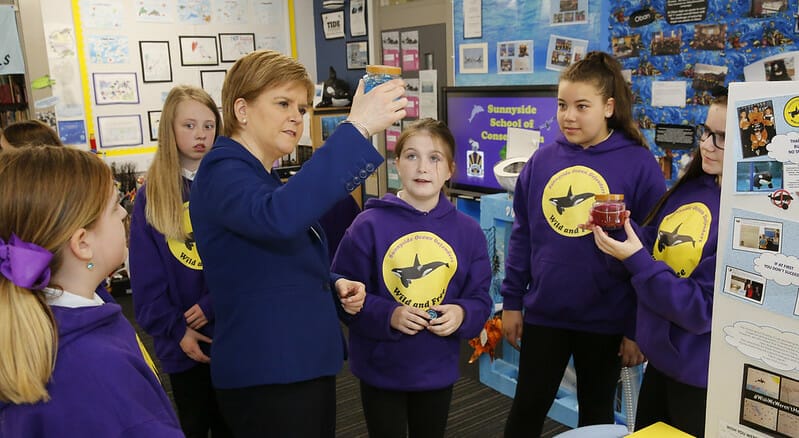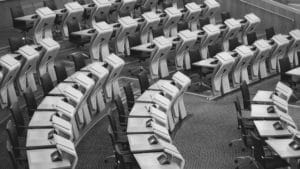During a speech in 2015, Nicola Sturgeon declared that she “wanted to be judged” on her education record and committed that it would be her “priority” during her time in office. In doing this, the First Minister opened the Scottish Government’s education performance up to regular criticism from opposition parties or, in the words of TES Magazine’s Scotland editor Henry Hepburn, “built a rod for her own back”. In this blog, Emma Currie explores some of the key moments in Scottish education during Nicola Sturgeon’s time as First Minister.
Attainment Gap
As the closing of the attainment gap between poorer and wealthier pupils was Nicola Sturgeon’s “defining mission”, it was not unfounded to assume that it would be included in her resignation speech, but it went unmentioned. Perhaps because it has since been recognised that the pledge to entirely close the poverty-related attainment gap would be – like Tony Blair’s pledge to eradicate child poverty – potentially impossible, and the wording of the commitment has since oscillated from “closing” to “substantially eliminating”. In 2015, the Scottish Attainment Challenge was launched to improve educational outcomes for children and young people impacted by poverty and includes support in the form of Pupil Equity Funding. On the one hand, there has been progress towards the substantial elimination of the attainment gap. Last year saw the biggest single year decrease in the gap in primary numeracy and literacy levels since records began in 2016-17, and 2022 SQA exam results showed pass rates for National 5s, Highers and Advanced Highers increase to record levels for any exam year since current qualifications were introduced. However, UCAS data has also found the difference between the most and least deprived pupils being accepted into university had increased by 50% since 2018, and Curriculum for Excellence data found the gap between the proportion of Secondary 3 pupils from the most and least deprived areas increased in both literacy and numeracy compared to 2018-19, and was the largest since 2016-17.
COVID
As with all sectors, the COVID pandemic vastly impacted on education and reversed some of the work carried out by the Scottish Government to improve its education record. The nature of the pandemic restrictions caused considerable challenges for both local and national government and caused education to remain at the top of the agenda. As was the case in the entirety of the UK, the closure of schools, colleges, and universities; the move to home learning; the cancellation of exams; fears over pupil and teacher safety; and rising educational inequalities dominated the political landscape. Although Nicola Sturgeon has been largely praised for her approach to mitigating impact of the pandemic on education in Scotland, the 2020 SQA exam results fiasco caused considerable controversy, with many school pupils taking part in protests over the results. While the First Minister apologised for the SQA’s decision to downgrade 124,000 recommended results from teacher recommendations and acknowledged the government “didn’t get this right”, some pupils had to fight for over a year to appeal their results.
SQA
The Scottish Government’s acceptance of Professor Ken Muir’s recommendation to create three new national education bodies, and the confirmation the SQA would be replaced by a new non-departmental public body responsible for the development and awarding of qualifications has raised questions surrounding the reform of Scottish education. Opposition parties have continuously expressed concerns relating to the reform – concerns which were exacerbated by information which showed half of the positions on the qualifications reform body were held by SQA staff, and only three teachers were involved in high-level reform discussions. Thus, questions of whether such reform would be substantive or simply a rebrand of the current SQA have been prevalent. Looking to the future, the results of the Scottish Government’s national discussion on education consultation should provide an insight into the views of stakeholders and practitioners and thus what the intricacies of such reform should look like.
Scottish National Standardised Assessments
The controversies surrounding Scottish National Standardised Assessments (SNSAs) – more commonly referred to as Primary 1 Assessments – were a long-running theme throughout Nicola Sturgeon’s term. While the government-commissioned independent review into the assessments recommended the Scottish Government continued the tests (albeit with “important modifications”), the assessments have received criticism because of their impact on teacher workload and issues with delivery, development, and data.
Early Years Education
The early learning and childcare (ELC) expansion to 1,140 hours per year, which was introduced in 2021, can be seen as key milestone in the First Ministers education record, as it caused families of more than 83,200 children to save £5,000 per eligible child annually. However, it has been met with ongoing criticism due to the disparities between local authorities and private, voluntary and independent sector nurseries and ELC staff pay rates.
Teacher Strikes
The First Minister’s final months in office coincided with the first national teacher strikes in almost 40 years. The EIS’ rejection of the Scottish Government’s pay offer for teachers – which would have seen a 6% pay rise in the current year and a further 5.5% increase in the new financial year – and its proposal to continue strike action over the exam season if the dispute is not resolved caused negotiations to continue to be a dominating element of political discussion. Although the government has now offered a 28-month pay package worth a cumulative value of 14.6% which convinced the EIS to suspend the strikes, as it has been found that Scotland’s school pupils have now lost over 2 million days of education, the issue will likely be a leading aspect of the new First Minister’s term.
Emma Currie is Newsdirect’s Scottish portfolio lead on education, skills and the rural economy.



